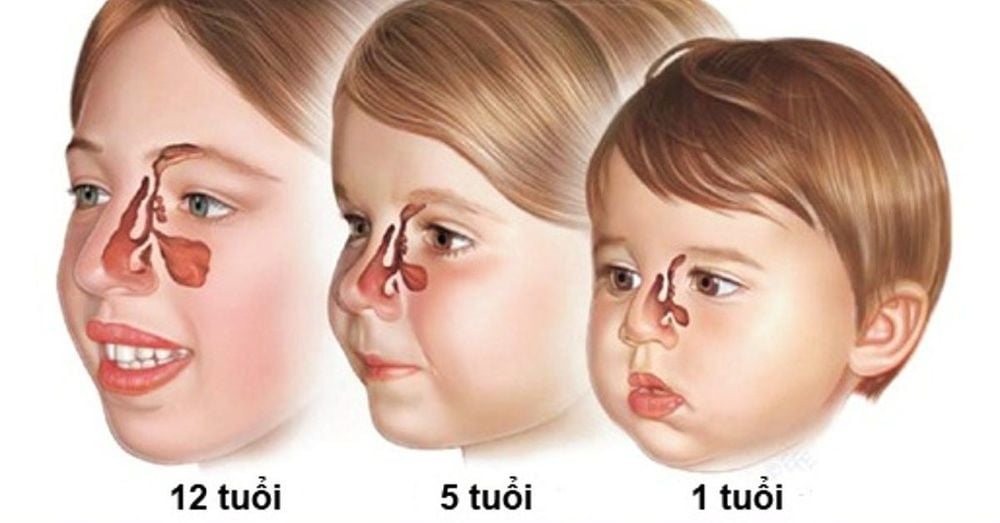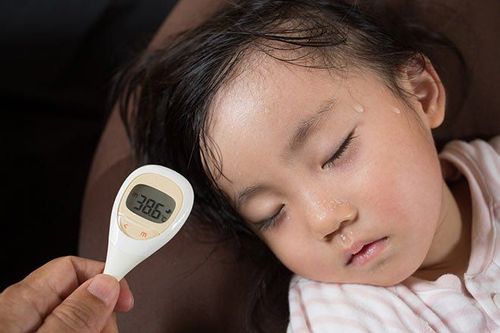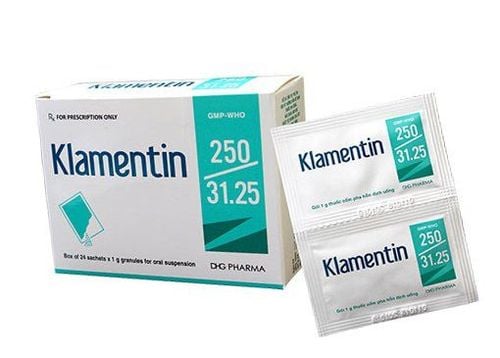This is an automatically translated article.
The article was professionally consulted with Specialist Doctor II Nguyen Van Thai - Ear, Nose Throat Doctor - Department of Medical Examination & Internal Medicine - Vinmec Danang International General Hospital.Sinusitis in children is common in children under 6 years of age who are malnourished, thin, have allergies, often suffer from upper respiratory tract infections, allergic rhinitis, etc., which cannot be cured. Long-term lead to sinusitis.
1. Causes of sinusitis in children
The sinus system in the craniofacial region includes: maxillary sinuses, frontal sinuses, ethmoid sinuses, and sphenoid sinuses. The sinuses are structured as hollow cavities covered with mucosa, which play a very important role, not only helping to lighten the facial bone mass, filtering and humidifying the air entering the nose, but also helping to resonate with sound. give each person a unique voice.Not only common in adults, sinusitis is also a common disease in children. There are many causes of sinusitis in children, the most common of which are viruses, bacteria, and fungi. Common bacteria are Streptococcus pneumoniae, Haemophilus influenzae, Pseudomonas aeruginosa, E.coli, Klebsiella,... These bacteria move upstream from the pharynx to the sinuses, causing sinusitis in children.
Sinusitis in young children is common in children under 6 years of age, especially those who are malnourished, thin, live in a polluted environment, dusty, often exposed to cigarette smoke, coal stoves or other diseases. Children with allergies, VA, tonsillitis. Sinusitis in children often begins with diseases such as:
Upper respiratory tract infection: Children have symptoms of cough, stuffy nose, runny nose, low fever, children get sick many times a year, sometimes take all the medicine. disease recurrence
● Allergic rhinitis: Children wheeze all day, runny nose, clear runny nose, accompanied by rales in the lungs.
Bronchial asthma: Due to bronchospasm, the child has intermittent shortness of breath, difficulty breathing during expiration.
● Immunodeficiency : common in children whose parents have AIDS.
● Children with anatomical abnormalities of the nasal cavity such as deviated septum, overexpansion of VA, VA, etc.
The above diseases cannot be cured, persist for a long time, causing swelling of the nasal mucosa of the child, Blocked nasopharynx leads to stagnation of fluid in the sinuses, leading to sinusitis for a long time.

2. Symptoms of sinusitis in children
The sinus system is not complete from birth. At birth, babies only have the ethmoid sinus located in the area above the nasal cavity, between the eyes, a little below the forehead. The sinus system gradually develops as the child grows up, the maxillary sinus appears when the child is 3-4 years old, the sphenoid sinus and the sphenoid sinus form when the child is 7-8 years old. Because the size of the sinuses of children is very small, the symptoms of sinusitis in children are not as specific as those of adults. On the other hand, because children are still young, they cannot describe their own symptoms, so taking the history diagnosis of the disease is difficult.Suspect a child with sinusitis when: After an episode of acute respiratory infection lasting more than a week, the child still has symptoms such as a low-grade fever, thick yellow or green nasal discharge, a foul odor, or a cough. often at night, easy to vomit, short of breath due to stuffy nose, or snoring, crying, not sleeping well, eyes with dark circles, body fatigue. Older children often complain of headache, heaviness in the face, edema around the eyes, toothache,...
Depending on the course of the disease, rhinosinusitis in children is divided into three types:
● Inflammation Acute sinusitis : duration of illness less than 4 weeks
● Subacute sinusitis : illness lasting 4-8 weeks
● Chronic sinusitis : lasting at least 8-12 weeks despite treatment
Illness Chronic sinusitis in children: the symptoms are prolonged but the severity is less. Children with intermittent mild fever, prolonged cough, hoarseness, earache, tinnitus, stuffy nose, runny nose, nose loses the ability to smell...

3. Dangerous complications of sinusitis in children
If sinusitis in children is untreated or inappropriately treated, the disease can cause many dangerous complications such as:Chronic pharyngitis, otitis media with fluid, nasal polyps
● Chronic bronchitis, asthma, persistent headache
Posterior optic neuritis, orbital irritation, eyelid inflammation, lacrimal sac
Osteomyelitis, cavernous vein thrombosis
Meningitis , encephalitis, brain abscess
4. Prevention of sinusitis in children
Complications of sinusitis in children are extremely dangerous, some complications can even be life-threatening. Therefore, parents must not be subjective, when a child has a stuffy nose due to a cold or allergy, they must quickly take the child to a medical facility for definitive treatment to prevent infection in the sinuses. Parents should not self-medicate their children or stop taking them without consulting a doctor.Limit children's contact with people who are suffering from respiratory infections, colds, stay away from cigarette smoke and allergens that cause allergic reactions if they have allergies. Teach children the habit of washing their hands often, especially before eating, and immediately after coming into contact with sick people. Clean the nose every day for children with deep sea water or physiological saline.
Keep the house clean and well ventilated, limit pets in the house, limit the use of air conditioning. Avoid letting children breathe dry air, you can use a humidifier to increase the humidity in the air where children live and study.
When leaving the house, have your child wear a mask to reduce the risk of inhaling dust and pollutants.
Pediatrics department at Vinmec International General Hospital is the address for receiving and examining diseases that infants and young children are susceptible to: viral fever, bacterial fever, otitis media, pneumonia in children, .... With modern equipment, sterile space, minimizing the impact as well as the risk of disease spread. Along with that is the dedication from the doctors with professional experience with pediatric patients, making the examination no longer a concern of the parents.
BSCK II Nguyen Van Thai was formerly a Doctor of Otolaryngology and Head and Neck Surgery at the Department of Otolaryngology - Hue Central Hospital with more than 17 years of treatment experience, especially in the field of Head and Neck Surgery. Currently, he is an Otolaryngologist at the Inter-Specialist Clinic of the Department of Medical Examination and Internal Medicine, Vinmec Da Nang International General Hospital.
Please dial HOTLINE for more information or register for an appointment HERE. Download MyVinmec app to make appointments faster and to manage your bookings easily.














